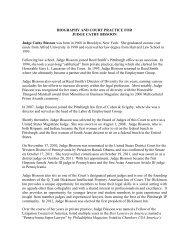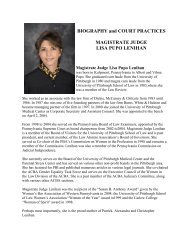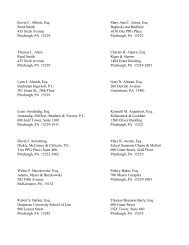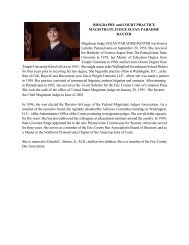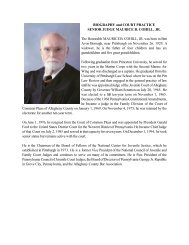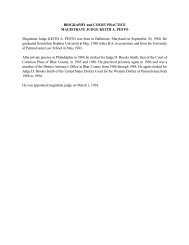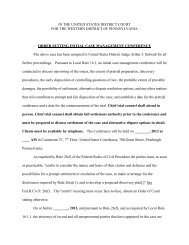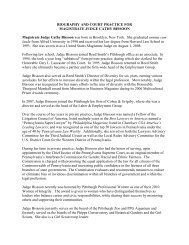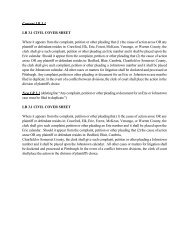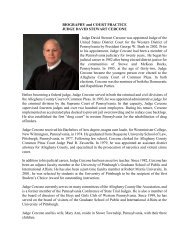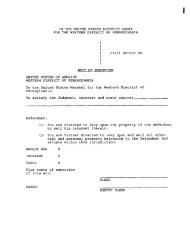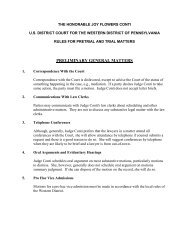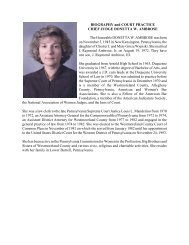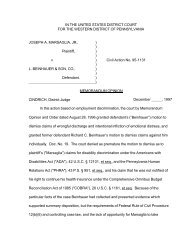Chief Magistrate Judge Francis X. Caiazza - Western District of ...
Chief Magistrate Judge Francis X. Caiazza - Western District of ...
Chief Magistrate Judge Francis X. Caiazza - Western District of ...
Create successful ePaper yourself
Turn your PDF publications into a flip-book with our unique Google optimized e-Paper software.
BIOGRAPHY and COURT PRACTICECHIEF MAGISTRATE JUDGE FRANCIS X. CAIAZZA<strong>Magistrate</strong> <strong>Judge</strong> FRANCIS X. CAIAZZA was born on October 27, 1935, the son <strong>of</strong> Hugo and Ann<strong>Caiazza</strong>. He is married to Roselee Morrone and they have three children, Matthew J., Felicia A. <strong>Francis</strong>coand Christian X. and four grandchildren, Grace, Alex, Peter and Zachary.He was graduated from New Castle High School in 1954, Duquesne University in 1958 with the degree<strong>of</strong> Bachelor <strong>of</strong> Arts and he was awarded an LL.B Degree from the University <strong>of</strong> Pittsburgh in 1961. Hewas engaged in the general practice <strong>of</strong> law in New Castle, Pa. from 1963 until his election to the Court <strong>of</strong>Common Pleas in 1982. He was admitted to practice law before the Supreme Court <strong>of</strong> Pennsylvania andthe Supreme Court <strong>of</strong> the United States. On June 1, 1994 he was appointed as a <strong>Magistrate</strong> <strong>Judge</strong> to theUnited States <strong>District</strong> Court for the <strong>Western</strong> <strong>District</strong> <strong>of</strong> Pennsylvania. He is also an Adjunct Pr<strong>of</strong>essor <strong>of</strong>Law at the School <strong>of</strong> Law, Duquesne University.He served in the United States Army from 1961 until 1963. Also, he has been active in a number <strong>of</strong> civicgroups such as Lark Workshop for the Handicapped, the Boy Scouts <strong>of</strong> America and the LawrenceCounty Labor-Management Committee. He is a member <strong>of</strong> St. Vitus Parish where he has served on thechurch committee, as a cantor, as a lector and also as a member <strong>of</strong> the church choir.
PRACTICES AND PROCEDURES OFCHIEF MAGISTRATE JUDGE FRANCIS X. CAIAZZAI. GENERAL MATTERSA. Communications with the Court<strong>Magistrate</strong> <strong>Judge</strong> <strong>Caiazza</strong> permits correspondence, but only as a means <strong>of</strong> communicatinggeneral administrative matters to the court. Requests for the rescheduling <strong>of</strong> statusconferences should be made by telephone, with counsel for all relevant parties on the line.Any other type <strong>of</strong> request for affirmative relief should be made by way <strong>of</strong> formal motion.Before filing a discovery motion, however, opposing counsel should telephone chambersso that the <strong>Judge</strong> may attempt to resolve the dispute without resort to motions practice.B. Communications with Staff<strong>Magistrate</strong> <strong>Judge</strong> <strong>Caiazza</strong> permits communications with his staff to discussadministrative matters, particularly the rescheduling <strong>of</strong> conferences and hearings, requeststo participate by phone, et cetera. Only under special circumstances, and for goodreason, should counsel call to inquire regarding the status <strong>of</strong> a pending motion.C. Telephone Conferences<strong>Magistrate</strong> <strong>Judge</strong> <strong>Caiazza</strong> will conduct status conferences by telephone under certaincircumstances, such as cases involving out-<strong>of</strong>-town counsel. The <strong>Judge</strong> prefers, however,that local counsel be present for conferences. If participation by telephone is approved,counsel is responsible for initiating the call, as directed by chambers.D. Pro Hac Vice Admissions<strong>Magistrate</strong> <strong>Judge</strong> <strong>Caiazza</strong> has no policy or requirements governing pro hac viceadmissions.E. Comment to the MediaAlthough <strong>Magistrate</strong> <strong>Caiazza</strong> does not think it appropriate for counsel to makecomments to the media about a pending case, he has no policy regarding mediacontact.II.MOTIONS PRACTICEA. Oral Argument<strong>Magistrate</strong> <strong>Judge</strong> <strong>Caiazza</strong> grants oral argument on the rarest <strong>of</strong> occasions, typically in casesinvolving highly complex legal or factual issues. Oral argument will be granted only ifrequested by counsel and deemed appropriate by the <strong>Judge</strong>. The <strong>Judge</strong> does not set asideany specific day or time to hold such arguments.
B. BriefsMotions seeking substantive legal ruling(s), whether dispositive or non-dispositive, shouldbe accompanied by a supporting brief. The supporting brief must be filedcontemporaneously with the motion. A brief may be omitted only if: (i) the motion is nondispositive,and (ii) the motion itself contains sufficient arguments and legal citation topermit meaningful judicial review.Reply briefs should not be submitted in connection with non-dispositive motions, absentleave <strong>of</strong> court. Reply briefs may be submitted in connection with dispositive motions. Anyreply brief submitted should be narrowly tailored to address only those matters newlyraised in the response brief.Sur-reply briefs are strongly disfavored, and they may be submitted only with leave <strong>of</strong>court.C. Chambers Copies <strong>of</strong> Motions<strong>Magistrate</strong> <strong>Judge</strong> <strong>Caiazza</strong> strongly prefers that no courtesy copies be sent to chambers.D. SchedulingUnless otherwise ordered, parties shall respond to non-dispositive motions within eleven(11) days. Absent leave <strong>of</strong> court, reply briefs should not be submitted in connection withnon-dispositive motions.The deadline for dispositive motions and responses thereto will be established by casemanagement order. See discussion infra regarding “Pretrial Conferences,” SectionIII(A)(2). Unless otherwise ordered, reply briefs in support <strong>of</strong> dispositive motions shouldbe filed within eleven (11) days.Any time a brief is to be filed in support <strong>of</strong> a motion, it must be filed simultaneously withthe motion. If a motion is not accompanied by a brief, <strong>Magistrate</strong> <strong>Judge</strong> <strong>Caiazza</strong> willpresume that no supporting brief is forthcoming.E. Evidentiary HearingsEvidentiary hearings on pretrial matters generally are scheduled well in advance <strong>of</strong> trial.When counsel conclude that an evidentiary hearing is appropriate, they should confer withopposing counsel and request a hearing by motion or through a conference call with thecourt.F. In Limine Motions<strong>Magistrate</strong> <strong>Judge</strong> <strong>Caiazza</strong> requires that motions in limine be filed and resolved prior to trial.A deadline for motions in limine will be established by court order.
III.CIVIL CASESA. Pretrial Procedures1. Local Rule 16.1<strong>Magistrate</strong> <strong>Caiazza</strong> does not issue a standard pretrial order. He does not requirethat pretrial statements contain any items other than those identified in Rule 16.1.d.2. Pretrial ConferencesAfter the filing <strong>of</strong> an answer by the defendant (or after the resolution <strong>of</strong> a timelyfiled 12(b) motion), <strong>Magistrate</strong> <strong>Judge</strong> <strong>Caiazza</strong> will schedule an initial statusconference. At the initial conference, dates for the discovery period will beestablished.A second conference will be scheduled after the close <strong>of</strong> discovery. At this time,deadlines for dispositive motions and responses thereto will be established.Once the court has ruled on any dispositive motions, a final conference before<strong>Magistrate</strong> <strong>Judge</strong> <strong>Caiazza</strong> will be held to discuss settlement and/or trial matters.3. Settlement<strong>Magistrate</strong> <strong>Judge</strong> <strong>Caiazza</strong> follows Local Rule 16.1.D in requiring counsel and theirclients, or persons with authority, to be present at settlement discussions.Presuming counsel has full authority to negotiate the settlement, and for good causeshown, the client may be permitted to participate by telephone on an as-neededbasis.On several occasions, <strong>Magistrate</strong> <strong>Judge</strong> <strong>Caiazza</strong> has suggested the possibility <strong>of</strong>alternate dispute resolution and/or participation in the court-annexed mediationprogram.4. ArbitrationEligible cases are routinely referred to the Court-Annexed Arbitration program,unless parties opt-out within the time limit specified in the Local Rule. The <strong>Judge</strong>is reluctant to grant extensions <strong>of</strong> time in Arbitration cases once a hearing has beenscheduled.5. Extensions and Continuances<strong>Magistrate</strong> <strong>Judge</strong> <strong>Caiazza</strong> does not have any special rules regarding requests forextensions or continuances. The <strong>Judge</strong> generally is amenable to grantingreasonable extensions <strong>of</strong> discovery deadlines or briefing schedules. With regardto scheduled conferences or hearings, the <strong>Judge</strong> is reluctant to reschedule thesematters without good cause.
B. Discovery Matters1. Length <strong>of</strong> Discovery Period and Extensions<strong>Magistrate</strong> <strong>Judge</strong> <strong>Caiazza</strong> generally allows 90-120 days for the parties to completediscovery. However, the <strong>Judge</strong> may lengthen or shorten this period depending onthe complexity <strong>of</strong> any given case. He is amenable to granting reasonableextensions in situations where they are required.2. Expert Witnesses<strong>Magistrate</strong> <strong>Judge</strong> <strong>Caiazza</strong> does not have a general policy with respect to expertwitness discovery.3. Deposition Disputes<strong>Magistrate</strong> <strong>Judge</strong> <strong>Caiazza</strong> will entertain telephone calls from attorneys at adeposition where his assistance is needed to resolve a discovery dispute. Beforecalling, opposing counsel should confer and attempt to reduce the number andbreadth <strong>of</strong> their true legal disputes.4. Stay <strong>of</strong> DiscoveryIf a dispositive motion is filed in lieu <strong>of</strong> an answer, or if counsel advised the Court<strong>of</strong> his or her intention to file such motion at the initial status conference, the<strong>Magistrate</strong> <strong>Judge</strong> will stay discovery during the pendency <strong>of</strong> the motion, unlessdiscovery is necessary for disposition <strong>of</strong> the motion. However, if the motion is filedduring discovery, the <strong>Judge</strong> will not stay further discovery unless requested bycounsel. The <strong>Judge</strong> believes that discovery should be stayed during the pendency<strong>of</strong> a “sincere” dispositive motion in an attempt to keep litigation as inexpensive aspossible.5. Limitations on Discovery<strong>Magistrate</strong> <strong>Judge</strong> <strong>Caiazza</strong> has not previously imposed any restrictions on thenumber <strong>of</strong> interrogatories, depositions, or the use <strong>of</strong> other discovery procedures.However, he will not permit discovery whose purpose is to harass the opposingparty or counsel.6. Rule 11 and Rule 37 Motions for SanctionsUnless otherwise ordered, <strong>Magistrate</strong> <strong>Judge</strong> <strong>Caiazza</strong> will not defer ruling on Rule11 or Rule 37 motions until the conclusion <strong>of</strong> the case. He requires briefs to befiled with the motions. If necessary, he will issue a briefing schedule. The <strong>Judge</strong>has awarded costs and fees in both Rule 11 and Rule 37 motions.C. Injunctions and TROs
When these matters are referred by a <strong>District</strong> Court <strong>Judge</strong> for Report andRecommendation, a briefing schedule will be issued and a hearing date will be scheduled.D. Trial Procedures1. Scheduling <strong>of</strong> casesAll trials scheduled before <strong>Magistrate</strong> <strong>Judge</strong> <strong>Caiazza</strong> are given a date certain fortrial. There is no “trial list” or backup schedule.<strong>Magistrate</strong> <strong>Judge</strong> <strong>Caiazza</strong> schedules all <strong>of</strong> his trials well in advance. Counsel areinvolved in the scheduling process, and the <strong>Judge</strong> will make reasonable efforts toaccommodate their vacation schedules and other pending matters at the time <strong>of</strong>scheduling. Once a trial date is set, however, the <strong>Judge</strong> is reluctant to rescheduleit.2. Trial Hours/DaysUnless otherwise specified, cases are tried between 9:00 a.m. and 4:30 p.m. onMonday through Friday. <strong>Magistrate</strong> <strong>Judge</strong> <strong>Caiazza</strong> expects counsel to appearpromptly so that the proceedings may commence on time.3. Trial Briefs<strong>Magistrate</strong> <strong>Judge</strong> <strong>Caiazza</strong> permits, but does not require, the filing <strong>of</strong> trial briefs.If a brief is to be filed, the <strong>Judge</strong> prefers that it be ten pages or less.4. Voir Dire<strong>Magistrate</strong> <strong>Judge</strong> <strong>Caiazza</strong> will conduct the preliminary voir dire <strong>of</strong> potential jurors.Thereafter, counsel may be permitted to participate in the voir dire. Althoughcounsel may submit proposed voir dire for the Court’s consideration one weekprior to the start <strong>of</strong> trial, the Court generally will not deviate from its standard voirdire questions.5. Note Taking by JurorsNote taking by jurors is not permitted. <strong>Magistrate</strong> <strong>Judge</strong> <strong>Caiazza</strong> believes that ifnote taking was permitted, jurors would spend more time taking notes thanlistening to the witnesses and relying on their own memories.6. Side Bars<strong>Magistrate</strong> <strong>Judge</strong> <strong>Caiazza</strong> permits side bar conferences, but discourages overlyrepetitive use <strong>of</strong> side bars. The <strong>Judge</strong> prefers that any issue that would require aside bar conference be brought to the Court’s attention outside <strong>of</strong> the presence <strong>of</strong>the jury.
7. Examination <strong>of</strong> Witnesses Out <strong>of</strong> Sequence<strong>Magistrate</strong> <strong>Judge</strong> <strong>Caiazza</strong> will permit the examination <strong>of</strong> a witness out <strong>of</strong> sequence,either within the party’s own case or within an opposing party’s case, if ascheduling conflict exists. In the event that a witness will be unavailable for trial,the witness’ testimony may be presented by deposition.8. Opening Statement and SummationsThere is no limit on the amount <strong>of</strong> time for either opening statement or summations.9. Examination <strong>of</strong> Witnesses or Argument by More Than One AttorneyJoint counsel may divide their responsibilities with respect to witnesses. However,the <strong>Judge</strong> will not allow two lawyers to question the same witness. In addition, thelawyer who handles a particular witness must also conduct any redirect <strong>of</strong> thatwitness, and make objections during cross examination <strong>of</strong> the witness.10. Examination <strong>of</strong> Witness Beyond Direct and Cross<strong>Magistrate</strong> <strong>Judge</strong> <strong>Caiazza</strong> will permit redirect and recross <strong>of</strong> a witness, but doesnot usually permit any further examination.11. Videotaped Testimony<strong>Magistrate</strong> <strong>Judge</strong> <strong>Caiazza</strong> does not have any special procedures or requirementswith respect to the use or admission <strong>of</strong> videotaped testimony. Counsel should,however, inform the court in advance <strong>of</strong> trial <strong>of</strong> the intention to use such evidence,so that the <strong>Judge</strong> and parties may discuss the procedures to be utilized.12. Reading <strong>of</strong> Material into Record<strong>Magistrate</strong> <strong>Judge</strong> <strong>Caiazza</strong> has no policy or rules on this point.13. Exhibits<strong>Magistrate</strong> <strong>Judge</strong> <strong>Caiazza</strong> requires that all exhibits be marked in advance <strong>of</strong> trialand properly identified for the record. Plaintiff’s exhibits should be marked bynumber and defendant’s exhibits should be marked by letter.14. Directed Verdict Motions<strong>Magistrate</strong> <strong>Judge</strong> <strong>Caiazza</strong> has no standard requirements with respect to motionsfor directed verdict or motions to dismiss in non-jury cases.15. Jury Instructions and Verdict Forms<strong>Magistrate</strong> <strong>Judge</strong> <strong>Caiazza</strong> generally utilizes standard jury instructions from FederalJury Practice. He will permit the submission <strong>of</strong> proposed jury instructions andproposed verdict forms. If proposed jury instructions are to be submitted, thecourt will establish an appropriate deadline for submission.
16. Proposed Findings <strong>of</strong> Fact and Conclusions <strong>of</strong> LawIn non-jury trials, <strong>Magistrate</strong> <strong>Judge</strong> <strong>Caiazza</strong> permits, and at times requests, thesubmission <strong>of</strong> proposed findings <strong>of</strong> fact and conclusions <strong>of</strong> law.17. Offers <strong>of</strong> Pro<strong>of</strong>There are no restrictions on <strong>of</strong>fers <strong>of</strong> pro<strong>of</strong> at trial.18. General Courtroom Rules<strong>Magistrate</strong> <strong>Judge</strong> <strong>Caiazza</strong> does not have any special rules regarding the conduct<strong>of</strong> attorneys during trial. The <strong>Judge</strong>, however, will not permit blatant discourtesybetween counsel.E. Jury Deliberations1. Written Jury Instructions<strong>Magistrate</strong> <strong>Judge</strong> <strong>Caiazza</strong> gives the jury a written copy <strong>of</strong> his jury instructions.2. Exhibits in the Jury Room<strong>Magistrate</strong> <strong>Judge</strong> <strong>Caiazza</strong> permits exhibits to be provided to the jury for theirdeliberations, so long as counsel agrees upon the exhibits that are provided.3. Jury Requests to Read Back Testimony or Reply Tapes DuringDeliberationsWhere appropriate, <strong>Magistrate</strong> <strong>Judge</strong> <strong>Caiazza</strong> will permit the reading back <strong>of</strong>testimony to the jury.4. Jury QuestionsIf a questions is submitted to the Court, the <strong>Judge</strong> will discuss the question withcounsel and obtain agreement on an appropriate answer to be given to the jury.5. Availability <strong>of</strong> Counsel During Jury DeliberationsCounsel must be available by telephone during jury deliberations.6. Interviewing the Jury<strong>Magistrate</strong> <strong>Judge</strong> <strong>Caiazza</strong> advises jurors that they do not have to respond toinquiries from counsel. However, he instructs the jurors that responses may behelpful to counsel.Although the <strong>Judge</strong> does not discourage counsel from interviewing jurors postverdict, lawyers should advise the Court <strong>of</strong> their intention to interview a juror priorto doing so.
F. General1. Special Types <strong>of</strong> CasesIn RICO cases, <strong>Magistrate</strong> <strong>Judge</strong> <strong>Caiazza</strong> requires the filing <strong>of</strong> a RICO statement.Otherwise, the <strong>Judge</strong> does not have any special procedure or practices withrespect to particular types <strong>of</strong> cases.2. Other Individual Practices/Procedures<strong>Magistrate</strong> <strong>Judge</strong> <strong>Caiazza</strong> requires all lawyers practicing before him to be punctual.IV.CRIMINAL CASESThe only criminal matters handled by <strong>Magistrate</strong> <strong>Judge</strong> <strong>Caiazza</strong> are petty <strong>of</strong>fenses, misdemeanors,and preliminary criminal matters including arraignments. Counsel areexpected to have conferred with the defendant prior to the arraignment and to appear at the scheduled time.



